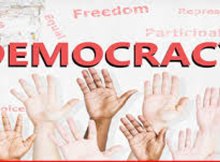Rarely has democracy been so acclaimed yet so breached, so promoted yet so disrespected, so important yet so disappointing as under the new regime in Mauritius.
It is striking how eager governments have become to pass themselves off as ‘democracies’. Why else, for example, would so ruthless a leader as Uzbekistan’s President Islam Karimov choose to stage elections? Why bother? He heads a government that has imprisoned some 7000 people for political and religious reasons, routinely tortured detainees, and as recently as 2005 massacred hundreds of protesters in Andijan. No one dared mount a serious challenge to his rule in the December 2007 elections, and even a constitutional prohibition against a third seven-year presidential term did not stand in his way. Yet, this brutal president found utility in holding an electoral charade to legitimize his reign. So, in recent years, have Robert Mugabe of Zimbabwe, Pervez Musharraf of Pakistan, Hosni Mubarak of Egypt, Meles Zenawi of Ethiopia, Mwai Kibaki of Kenya, Than Shwe of Burma, and Vladimir Putin of Russia.
The task the regimes face is to appear to embrace democratic principles while avoiding any risk of succumbing to popular preferences. Electoral fraud, political intimidation, press censorship, repression of civil society, even police rule have all been used to curtail the prospect that the proclaimed process of democratization might actually lead to a popular say in government.
Media are essential for conveying popular concerns between elections – a necessary input because a single vote cast every few years is a crude and insufficient method to make popular concerns known. It is thus no surprise that governments trying to control the democratic process seek to silence the press. The nation’s voice is rising to a certain level, but is curtailed by all the machinations the ruling dispensation is resorting to.
We cringe to realise that there is no International Convention on Democracy, no widely ratified treaty affirming how a government must behave to earn the democracy label. The meaning of democracy lies too much in the eye of the beholder. It is not that pseudo-democratic leaders gain much legitimacy at home. The local population knows all too bitterly what a farce the elections really are. At best, these leaders gain the benefit of feigned compliance with local laws requiring elections.
In Mauritius, people have just had enough seeing the same heads bob up as soon as elections are announced. Each wave of a major election in the country has brought the favourite slogan of all ‘we want change’. Paul Berenger, who should now be considered the dean of all political parties’ members and leaders, has brandished the coinage of ‘change’ under the purple flag of his party. And yet, today change is again sought. One should then ask: what type of change was brought about by each party which came to power to form a government?
But if ‘the road to democracy’ permits locking up political opponents, dismissing independent lawyers, and silencing the independent press, it is easy to see why tyrants the world over would be tempted to believe that they, too, might be eligible. As such unworthy claimants as the leaders of Egypt, Ethiopia, Kazakhstan, and Nigeria wrap themselves in the democracy mantle with scant international objection, the concept of democracy gets cheapened, its key human rights components cast aside.


